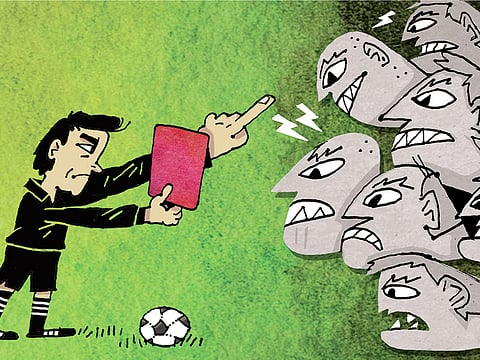Racism should be excised from sport
Football officials and media should play a constructive role in the fight against unruly behaviour

Football is the most popular sport in the world, one that entertains millions of people. Among the millions of fans around the globe, there are fanatical supporters known as ultras. They exist everywhere. Ultras are always present at stadiumd to cheer their teams, clubs or countries, wherever they are playing. More so in Europe.
In the past three decades, the composition of national teams has undergone a drastic change. Earlier, the teams tended to be homogenous. But now, you find several ethnicities being represented in national teams. And the legion of fans, including ultras, never had a problem with that.
There has been a long list of players of African, Arab, Asian and South American heritage who chose to represent European countries rather than playing for the nations from where they trace their ancestry.
Zinedine Zidane hails from Algeria but played for France; Jose Bosingwa has roots in Congo but chose to don Portugal colours; Mario Balotelli’s parents are from Ghana, and he represented Italy; Diego Costa is from Brazil but preferred Spain; Marouane Fellaini has Moroccan blood in his veins but mans the midfield for Belgium; Yohan Cabaye is of Vietnamese descent, but he is a French international, and Nigel De Yong’s Suriname links didn’t stop him from turning out for the Netherlands.
All these stars have played for their adopted countries with distinction. That is why the Mesut Ozil controversy is difficult to comprehend. The Gelsenkirchen-born German midfield icon’s parents were Turkish immigrants. And that did not stop him from representing the German national side (Mannschaft) 92 times, including appearances that won the 2014 World Cup in Brazil. So it came as a huge surprise when Ozil announced his retirement from international football after suffering what he described as “racist and disrespectful” treatment at the hands of the German Football Association (GFA) and many fans.
Ozil was heavily criticised in the mainstream media and social media platforms after he posed for photographs with Turkey’s President Recep Tayyip Erdogan in London in May, ahead of the 2018 World Cup in Russia. He was asked to explain the picture that media, fans and GFA President Reinhard Grindel described as ‘controversial’.
Ozil and Ilkay Gundogan explained the Erdogan meeting, saying it was not meant as a political statement. But when Grindel insisted on a formal statement, Ozil fired back at his critics and accused Grindel and the GFA citing ‘racist and disrespectful’ treatment. After a weeklong media fracas, Grindel said that he regretted how the GFA’s criticism of the photo “was abused for racist slogans”.
Upholding sportsmanship
The controversy triggered debates on the status of international players with dual heritage. Ozil’s Mannschaft teammate, Gundogan, who is also of Turkish descent, was far from being criticised for posing in the same picture with Erdogan. So the question is why was Ozil singled out by fans, media and the GFA.
Why would football associations, media and fans question the loyalty of players in national teams if they trace their ancestry to another country. Playing for the national team is a matter of honour. Football is an international sport, and sportsmanship should prevail.
Europe and Europeans have generally welcomed immigrants. These nations have always backed democratic values of free speech and the rights of individuals. Racial bias has never been much of a problem.
But in the past few years, football stadiums in Europe have witnessed unprecedented incidents of racism and discrimination. Monkey chants have been directed to French players Kylian Mbappe and Paul Pogba during international friendlies. During the 2018 World Cup, Swiss strikers of Albanian descent, Granit Xhaka and Xherdan Shaqiri, came under fire for their goal celebrations that harked back to Serbia.
There have been noticeable incidents in which the ultras, who take up the seats near the corners of the pitch and indulge in racist taunts and jeering. The Ozil incident and other such incidents should act as a wakeup call to step up the fight against racism and bigotry in sport.
In May 2013, the game’s international governing body of association football, Fifa announced new measures to deal with racism. Other sports bodies should follow suit to preserve the sanctity of the sport so that players and fans continue to enjoy matches without needless distraction.
Football associations at all levels of the game should prevent ultras from usurping fans’ seats. Special committees should monitor TV coverage to spot unacceptable behaviour from fans. Such fans should be banned from entering stadiums, and charges should be pressed against them if their actions amount to a crime.
The mainstream media and social media should play a more constructive role to combat the reprehensible behaviour of fans and officials so that football remains untainted by the actions of a few. Football is a passion and a pastime. Let’s enjoy it.



